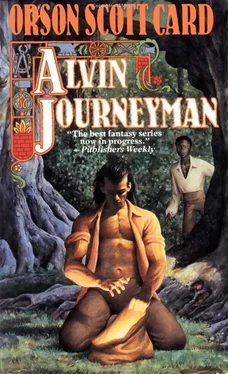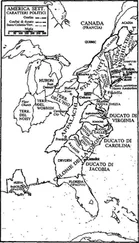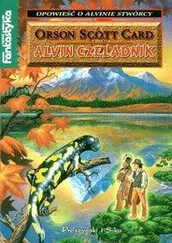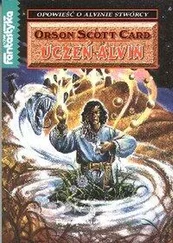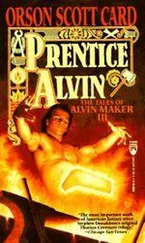Orson Card - ALVIN JOURNEYMAN
Здесь есть возможность читать онлайн «Orson Card - ALVIN JOURNEYMAN» весь текст электронной книги совершенно бесплатно (целиком полную версию без сокращений). В некоторых случаях можно слушать аудио, скачать через торрент в формате fb2 и присутствует краткое содержание. Жанр: Фантастика и фэнтези, на английском языке. Описание произведения, (предисловие) а так же отзывы посетителей доступны на портале библиотеки ЛибКат.
- Название:ALVIN JOURNEYMAN
- Автор:
- Жанр:
- Год:неизвестен
- ISBN:нет данных
- Рейтинг книги:3 / 5. Голосов: 1
-
Избранное:Добавить в избранное
- Отзывы:
-
Ваша оценка:
- 60
- 1
- 2
- 3
- 4
- 5
ALVIN JOURNEYMAN: краткое содержание, описание и аннотация
Предлагаем к чтению аннотацию, описание, краткое содержание или предисловие (зависит от того, что написал сам автор книги «ALVIN JOURNEYMAN»). Если вы не нашли необходимую информацию о книге — напишите в комментариях, мы постараемся отыскать её.
ALVIN JOURNEYMAN — читать онлайн бесплатно полную книгу (весь текст) целиком
Ниже представлен текст книги, разбитый по страницам. Система сохранения места последней прочитанной страницы, позволяет с удобством читать онлайн бесплатно книгу «ALVIN JOURNEYMAN», без необходимости каждый раз заново искать на чём Вы остановились. Поставьте закладку, и сможете в любой момент перейти на страницу, на которой закончили чтение.
Интервал:
Закладка:
Yet he breathed no word of these conclusions. You could be burned as an atheist just as fast as you could be burned as a witch. And besides, he wasn't sure he didn't believe in anything. He just didn't believe in what the ministers said.
If the preachers had no idea of what was good or evil, where could he turn to learn about right and wrong? He tried reading philosophy at Manchester, but found that except for Newton, the best the philosophers had to offer was a vast sea of opinion with a few blocks of truth floating here and there like wreckage from a sunken ship. And Newton and the scientists who followed him had no soul. By deciding that they would study only that which could be verified under controlled conditions, they had merely limited their field of endeavor. Most truth lay outside the neat confines of science; and even within those boundaries, Verily Cooper, with his keen eye for things which did not fit, soon found that while the pretense of impartiality was universal, the fact of it was very rare. Most scientists, like most philosophers and most theologians, were captives of received opinion. To swim against the tide was beyond their powers, and sa truth remained scattered, unassembled, waterlogged.
At least lawyers knew they were dealing with tradition, not truth; with consensus, not objective reality. And a man who understood how things fit together might make a real contribution. Might save a few people from injustice. Might even, in some far distant year, strike a blow or two against the witchery laws and spare those few dozen souls a year so incautious as to be caught manipulating reality in unapproved ways.
As for Arise and Wept, they were deeply gratified when their son Verily left home expressing no interest in the family business. Their oldest child, Mocky (full name: He Will Not Be Mocked Cooper) was a skilled barrelmaker and popular both inside and outside the family. He would inherit everything. Verily would go to London and Arise and Wept would no longer be responsible for him. Verily even gave them a quit-claim against the family estate, though they hadn't asked for it. When Arise accepted the document, twenty-one-year-old Verily took the birch rod from where it hung on the wall, broke it over his knee, and fed it into the kitchen fire. There was no further discussion of the matter. All understood: What Verily chose to do with his powers was his own business now.
Verily's talents were immediately noticed. He was invited to join several law firms, and finally chose the one that gave him the greatest independence to choose his own clients. His reputation soared as he won case after case; but what impressed the lawyers who truly understood these things was not the number of victories, but rather the even larger number of cases that were settled justly without even going to trial. By the time Verily turned twenty-five, it was becoming a custom several times a month for both parties in hotly contested lawsuits to come to Verily and beg him to be their arbiter, completely sidestepping the courts: such was his reputation as a wise and just man. Some whispered that in due course he would become a great force in politics. Some dared to wish that such a man might someday be Lord Protector, if that office were only filled by election, like the presidency of the United States.
The United States of America—that motley, multilingual, mongrel, mossbacked republic that had somehow, kingless and causeless, arisen by accident between the Crown Lands and New England. America, where men wearing buckskin were said to walk the halls of Congress along with Reds, Dutchmen, Swedes, and other semi-civilized specimens who would have been ejected from Parliament before they could speak a word aloud. More and more Verily Cooper turned his eyes to that country; more and more he yearned to live in a place where his gift for making things fit together could be used to the fullest. Where he could join things together with his hands, not just with his mind and with his words. Where, in short, he could live without deception.
Maybe in such a land, where men did not have to lie about who they were in order to be granted the right to live, maybe in such a land he could find his way to some kind of truth, some kind of understanding about what the universe was for. And, failing that, at Icast Verily could be free there.
The trouble was, it was English law that Verily had studied, and it was English clients who were on the way to making him a rich man. What if he married? What if he had children? What kind of life would he make for them in America, amid the forest primeval? How could he ask a wife to leave civilization and go to Philadelphia?
And he wanted a wife. He wanted to raise children. He wanted to prove that goodness wasn't beaten into children, that fear was not the fount from which virtue flowed. He wanted to be able to gather his family in his arms and know that not one of them dreaded the sight of him, or felt the need to lie to him in order to have his love.
So he dreamed of America but stayed in London, searching in high society to find the right woman to make a family with. By now his homely manners had been replaced by university fashion and finally with courtliness that made him welcome in the finest houses. His wit, never biting, always deep, made him a popular guest in the great salons of London, and if he was never invited to the same dinners or parties as the leading theologians of the day, it was not because he was thought to be an atheist, but rather because there were no theologians regarded as his equal in conversation. One had to place Verily Cooper with at least one who could hold his own with him—everyone knew that Very was far too kindhearted to destroy fools for public entertainment. He simply fell silent when surrounded by those of dimmer wit; it was a shameful thing for a host when word spread that Verily Cooper had been silent all night long.
Verily Cooper was twenty-six years old when he found himself at a party with a remarkable young American named Calvin Miller.
Verily noticed him at once, because he didn't fit, but it wasn't because of his Americanness. In fact, Verily could see at once that Calvin had done a good job of acquiring a veneer of manners that kept him from the most egregious faux pas that bedevilled most Americans who attempted to make their way in London. The boy was going on about his effort to learn French, joking about how abominably untalented he was at languages; but Verily saw (as did many others) that this was all pretense. When Calvin spoke French each phrase came out with splendid accents, and if his vocabulary was lacking, his grammar was not.
A lady near Verily murmured to him, "If he's bad at languages, I shudder to imagine what he's good at."
Lying, that's what he's good at, thought Verily. But he kept his mouth shut, because how could he possibly know that Calvin's every word was false, except because he knew that nothing fit when Calvin was speaking? The boy was fascinating if only because he seemed to lie when there was no possible benefit from lying; he lied for the sheer joy of it.
Was this what America produced? The land that in Verily's fantasies was a place of truth, and this was what was spawned there? Maybe the ministers were not wholly wrong about those with hidden powers-or "knacks," as the Americans quaintly called them.
"Mr. Miller," said Wrily. "I wonder, since you're an American, if you have any personal knowledge of knacks."
The room fell silent. To speak of such things—it was only slightly less crude than to speak of personal hygiene. And when it was rising young barrister Verily Cooper doing the asking...
"I beg your pardon?" asked Calvin.
"Knacks," said Verily. "Hidden powers. I know that they're legal in America, and yet Americans profess to be Christian. Therefore I'm curious about how such things are rationalized, when here they are considered to be proof of one's enslavement to Satan and worthy of a sentence of death."
Читать дальшеИнтервал:
Закладка:
Похожие книги на «ALVIN JOURNEYMAN»
Представляем Вашему вниманию похожие книги на «ALVIN JOURNEYMAN» списком для выбора. Мы отобрали схожую по названию и смыслу литературу в надежде предоставить читателям больше вариантов отыскать новые, интересные, ещё непрочитанные произведения.
Обсуждение, отзывы о книге «ALVIN JOURNEYMAN» и просто собственные мнения читателей. Оставьте ваши комментарии, напишите, что Вы думаете о произведении, его смысле или главных героях. Укажите что конкретно понравилось, а что нет, и почему Вы так считаете.
